Una persona con una sexualidad fluida.- entrevista
- Obtener vínculo
- X
- Correo electrónico
- Otras apps
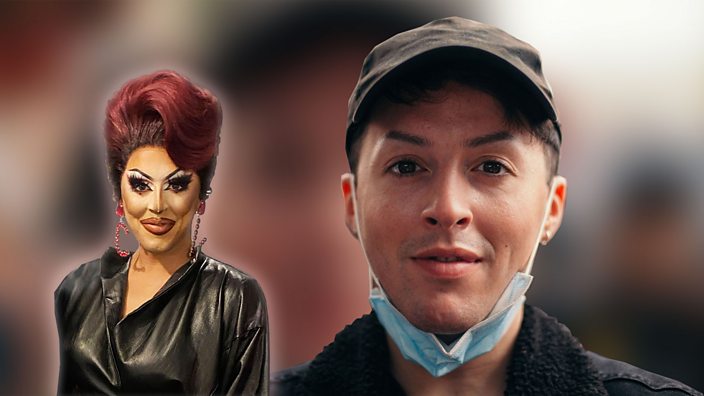 BBC
BBCCherry Valentine: 'My family know my sexuality, but we don’t talk about it'
As the first Traveller queen on RuPaul’s Drag Race, Cherry Valentine shone a light on what it’s like to be LGBT and from the Traveller community. In a new documentary, they open up about their struggle to be true to themselves
Warning: Contains references to suicide
With precision contouring, figure-hugging outfits and charisma as big as her hair, Cherry Valentine fitted right in as a contestant on RuPaul’s Drag Race.
But under the flamboyant persona is a long struggle for acceptance. When not in drag, Cherry is George Ward, a 27-year-old mental health nurse. In a new documentary for BBC Three, George opens up about their Traveller heritage, and the difficulties of being LGBT+ in that community.
“I always felt like I didn’t really fit in,” says George. “I had views that were very different to those I was brought up with. I was never attracted to women, but it was always told to me by my parents that I needed to get a girlfriend and get married.”
George, who is from the Romany community and grew up in Darlington, identifies as gender fluid, which means they don’t have a fixed identity of being male or female, and uses the pronouns they and them. They knew from a young age that they didn’t want to follow the traditional path expected of them.
“I remember being a five year old and running around in my mum’s heels when she was out of the house. Even hiding that at a young age makes you feel a bit different.”
In the programme, George reveals that they came out to their family by writing them a letter, before running away from home for over a week. They switched off their phone and stayed with a friend.
“I was terrified to be so honest with them about something that I was always told was wrong,” says George. “I never planned to write a letter then run away, but it was a response to a really rough time. It felt like the only way out.”
'We don’t talk about my sexuality'
When they returned to their parents’ home, they were taken for a drive individually by each parent to talk – but after that, George’s sexuality and gender identity was never discussed again.
“I’d never had open conversations with anyone in my family about my sexuality or gender, apart from my mother. Everyone’s very aware of it, but we don’t talk about it. I haven’t seen some of my family in years. I’ve never physically come out to any of them,” they explain.
“After filming the documentary I’ve spoken to them all, and it’s made it a lot easier to talk about.”
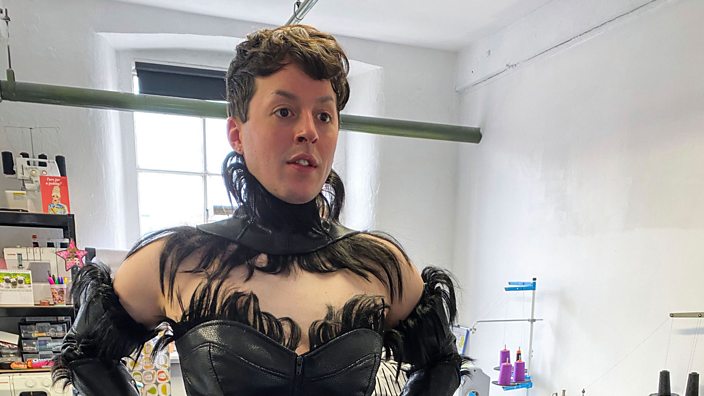 BBC
BBCIn the programme, George is encouraged by meeting other LGBT members of the Traveller community who’ve kept up good relationships with their families. But while they think things are changing in terms of acceptance in wider society, they say it’s a slower process in the Traveller community.
“The community is very traditional in their views and it’s quite stereotypical. The men are men, they don’t talk about their feelings or have many feelings on the surface. The women don’t work, they stay home and look after the children. It’s so outdated. I think that’s one of the reasons the levels of suicide are so high in the community, especially among men – they don’t talk about their feelings.”
'You’re told you shouldn’t have those feelings'
While the ethnicity of suicide victims is not recorded in England and Wales, research from Ireland suggests that Travellers may have a suicide rate 6.6% higher than that of non-Travellers, and among Traveller men, suicide was most common in the 15-25 age group.
George remembers overhearing upsetting conversations growing up about men in the community who’d taken their own lives.
“I heard conversations with my parents like ‘this person’s killed themselves, they’ve been found,” they say. “It’s really sad and horrendous. But it was something you’d hear about quite often.”
George admits that they have felt suicidal, and that being LGBT and a Traveller was like a “double load” of things to deal with. “I’ve felt that way, and sometimes you do think it’s the only way out. You can’t talk about your feelings, but even if you do, it’s feelings you’re told you shouldn’t have.”
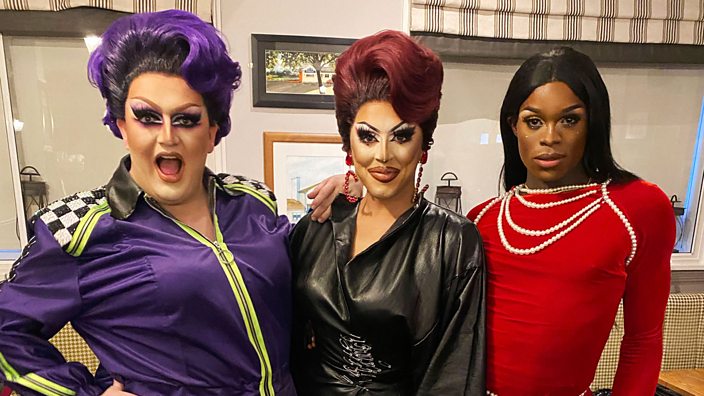 BBC
BBCTyler Hatwell, 29, founded Traveller Pride in 2017, and appears in the documentary. Tyler is from the Showman community and is bisexual. Showmen travel around staging funfairs, but the term describes their ethnicity as well as their occupation.
“For me in terms of sexuality, it’s a kind of blessing and a curse that being bisexual meant I could hide it because I dated girls,” he says. He came out to his parents when he began living with a boyfriend.
“I’d moved to London, and it was pretty obvious it was a one bedroom flat shared by two men!” he laughs. “I don’t know if I felt ready, but I felt like I had to do it [come out]. Their reaction was a lot better than I expected, I was terrified of a worst case scenario.”
He thinks that coming out is especially difficult for Travellers because being LGBT and a Traveller leaves people worried about facing prejudice from both within and outside the Traveller community.
'Would I be unwelcome as a Traveller in an LGBT space?'
“People think that Travellers are homophobic or transphobic, or some way backwards and old fashioned. That can be true for some families, but equally it’s completely untrue for others,” Tyler says.
“Because there’s a lot of discrimination for being a Traveller, your family becomes really important to you because they’re the ones who’ve got your back. Especially if you’re nomadic, it’s not even like there’s a local community. Anything that threatens to disrupt the family is scary, because of how hostile the rest of the world can be.”
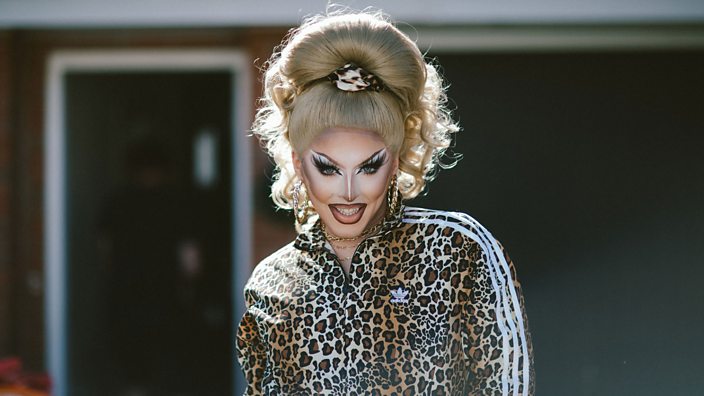 BBC
BBCHe says reconciling both parts of your identity can be tricky.
“It’s like, if I go to the LGBT event, what if I mention growing up in a trailer, am I not going to be welcome in that space? There’s a real sense of having to think about your identity a lot more and think where’s safe to have that conversation.”
As for the people involved with Traveller Pride, Tyler says it spans all age groups.
“There’s a young generation of Travellers online, on TikTok, who really don’t care, which is beautiful,” he says.
“But what’s interesting is that the older generation, people who come to us in their 40s or 50s and have this narrative of how Travellers are, they’re side by side in the meetings and WhatsApp groups [with young people] and see this massive variety in what it means to be a Traveller and LGBT.”
'Drag gave me an escape'
George was the first member of their family to go to university. “My mam said to me, ‘If you want to go to university, then go to one that’s close to home’, but I thought there’s no way in a million years I could do that,” says George, who studied mental health nursing.
“I had to move away to Lancaster. I fended for myself for a few years, and that’s where I discovered the LGBT community.”
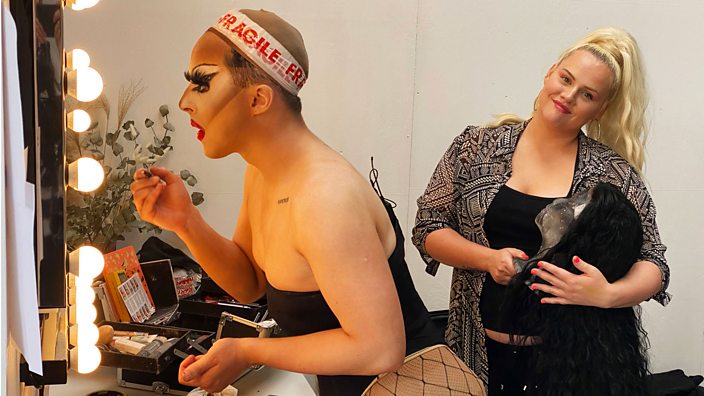 BBC
BBCIt was then that they started being themselves more openly, and getting further into drag.
“Drag made me feel like I had an escape,” they say. I’d been doing drag before I even knew what it was called – I was always fascinated with makeup and clothes and fashion. But I could never verbalise it. It sounds over the top, but drag really did save my life.”
They’re also pleased that by opening up about their journey, they’ve helped other people do the same. “I never set out to be any type of role model, I’m just speaking my truth and whatever comes from it, comes from it. But it’s very humbling when people reach out and send me messages. I’m really thankful and happy that there is the ability to talk about things.”
They encourage any young Travellers who are LGBT to “be mindful” about coming out, and to “plan ahead”.
“There is always someone you can talk to, it just has to be the right person. Find your people,” they say. “And remember, you really aren’t alone.”
If you have been affected by any of the issues raised, help and advice can be found here.
Cherry Valentine: Gypsy Queen and Proud, is on BBC iPlayer now

Comentarios
Publicar un comentario